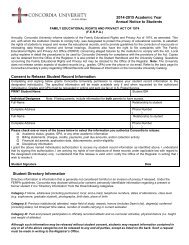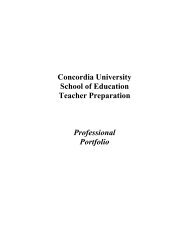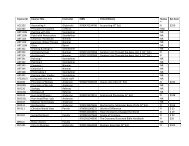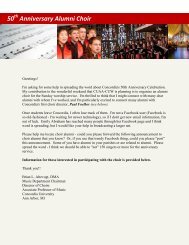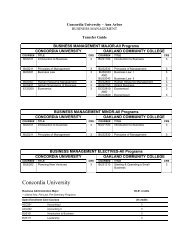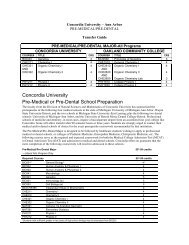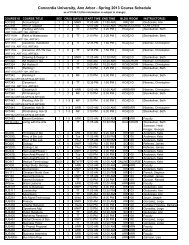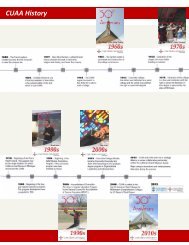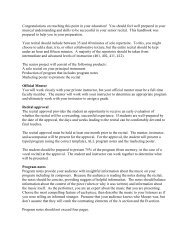2009â2010 Academic Catalog - Concordia University Ann Arbor
2009â2010 Academic Catalog - Concordia University Ann Arbor
2009â2010 Academic Catalog - Concordia University Ann Arbor
You also want an ePaper? Increase the reach of your titles
YUMPU automatically turns print PDFs into web optimized ePapers that Google loves.
<strong>Concordia</strong> <strong>University</strong> <strong>Ann</strong> <strong>Arbor</strong> 2009–2010 <strong>Academic</strong> <strong>Catalog</strong><br />
d. A grounding in economics, particularly elementary micro-economic theory, and an understanding of the<br />
interaction between economic theory and public policy<br />
e. Some basic mathematical and financial skills, such as an understanding of basic pre-calculus<br />
mathematics and an ability to analyze financial data<br />
f. A basic understanding of human behavior and social interaction<br />
g. An understanding of diverse cultures within and beyond the United States, of international institutions<br />
and issues, and of the increasing interdependence of the nations and communities within our world<br />
Recommendations<br />
In keeping with the guidelines suggested by the ABA, we recommend a broad social science major (this can be<br />
arranged as an individualized major) with the following components:<br />
1. American history (HIS111 and HIS112), Racial and cultural minorities (HIS355)<br />
2. Sociology (SOC101), Ethnographic Geography/Cultural Anthropology (SOC/GEO321)<br />
3. Economics (ECO200)<br />
4. General Psychology (PSY101)<br />
5. American government (POS101), The Politics of Civil Liberties (POS361)<br />
6. Additional 36 semester hours of social science electives<br />
Other Electives: College Algebra (MAT111), Elementary Statistics (MAT261), Accounting I (ACC201)<br />
Other Major/Minor Combinations: English /Communications<br />
Pre-Seminary Program<br />
The Pre-Seminary curriculum at <strong>Concordia</strong> <strong>University</strong>, <strong>Ann</strong> <strong>Arbor</strong> provides students with the knowledge,<br />
skills, and understandings which lay the foundation for entrance into graduate work to become a pastor or<br />
church worker. It is designed toward entrance into one of the seminaries of the Lutheran Church-Missouri<br />
Synod and it also functions well as preparation for entrance into any Christian seminary. The program allows<br />
students maximum flexibility while maintaining high standards of academic preparedness. The Pre-seminary<br />
Council requires that Pre-Seminary students take the following 38 credits, 6 of which are included in general<br />
studies.<br />
Pre-Seminary Program<br />
Theology—Required Courses<br />
38 credits<br />
18 credits<br />
REL241 Biblical Literature I-Old Testament 3<br />
(Credits may be applied to the General Studies Religion Requirement)<br />
REL242 Biblical Literature II-New Testament 3<br />
REL321 History of Christian Thought 3<br />
(Credits may be applied to the General Studies Religion Requirement)<br />
THY301* Christian Doctrine I 3<br />
THY302* Christian Doctrine II 3<br />
* Non-LCMS students may request substitutions. Acceptable alternatives are listed in the Pre-Seminary Handbook, available from the<br />
Pre-Seminary Director.<br />
Select 3 credits from the following Philosophy courses.<br />
PHI321 History/Problems of Western Philosophy 3<br />
PHI322 Issues in Western Philosophy 3<br />
PHI355 Argument Analysis 3<br />
Biblical Languages<br />
20 credits<br />
—Required Course, except for Pre-Deaconess students who may request substitutions<br />
GRE201A Elementary Greek I 4<br />
GRE202A Elementary Greek II 4<br />
Pg. 46 of 118



